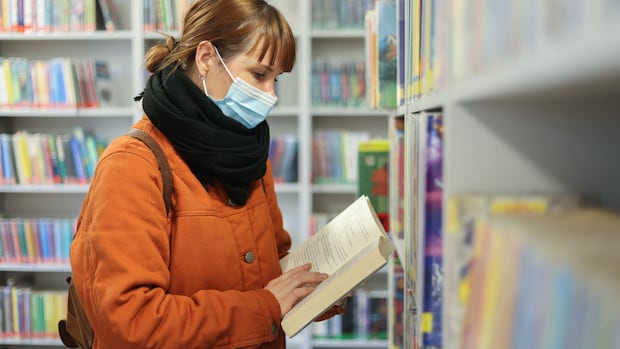White Coat Black Art ·THE DOSEInfectious disease experts say it’s too soon to precisely predict how severe this year’s major respiratory infections will be, but nonetheless recommend vaccines and physical distancing measures.Health-care experts recommend flu shots, COVID-19 and RSV vaccines for high-risk groupsSameer Chhabra · CBC Radio · Posted: Oct 11, 2025 4:00 AM EDT | Last Updated: 6 hours agoExperts recommend wearing face masks if you have symptoms of a respiratory infection. (Jakub Tabisz/Shutterstock)LISTEN | How can we protect ourselves from fall and winter respiratory viruses?:The Dose25:19How can we protect ourselves from fall and winter respiratory viruses?Fall in Canada is known for crisp breezes and colourful foliage – as well as a new wave of respiratory virus infections.Infectious disease experts say it’s too soon to precisely predict how severe this year’s major respiratory infections will be. However, they recommend that high risk groups like children, the elderly and immunocompromised people get their flu and COVID-19 vaccines once the shots are available. Here’s what else experts think Canadians should know about this year’s fall and winter respiratory virus season. Severity ‘all over the map’Canada’s respiratory virus surveillance report released this week showed that among respiratory virus tests that Canada monitors, the ones for COVID-19 are currently the most likely to be positive.COVID-19 tests brought back 9.6 per cent positive tests, compared to 0.6 per cent for flu tests and 0.3 per cent of respiratory syncytial virus (RSV) tests, as of Oct. 10.Positive test results for both COVID and RSV are slightly down from last year, while flu test results are slightly higher this year. Rates of RSV are usually fairly stable, according to University of Toronto infectious diseases specialist Dr. Allison McGeer. WATCH | Doctor reminds public to get vaccinated as new COVID shots approved:Doctor reminds public to get vaccinated as new COVID shots approvedNew COVID-19 vaccines are set to be released this fall. As CBC’s Johna Baylon reports, it comes as recent federal government data shows a gradual increase in COVID infections this August.The southern hemisphere saw a late arrival of the H3N2 influenza subtype, which might influence the flu season in the northern hemisphere, including Canada.”Flu, of course, is anybody’s guess any time,” McGeer told The Dose host Dr. Brian Goldman.As for COVID-19, McGeer said predictive models such as those from Johns Hopkins University suggest a range of potential severity for the virus.“This year it is literally all over the map,” said McGeer. “It’s just impossible to predict whether we’re going to have a winter season with COVID and how bad it’s going to be.”Experts also note that the type of flu strains in circulation, as well as which COVID-19 variants are dominant, could influence severity.Regardless of severity, waves of respiratory infections are fairly predictable, according to infectious diseases specialist Dr. Sumon Chakrabarti.The season starts in September, when most children go back to school, ramping up from November to January.”We have increased respiratory viruses, particularly influenza, RSV, and this can stress out our health-care system,” said Chakrabarti. Experts recommend wearing masks in crowded settings, as well as in hospitals and long-term care homes. Staying home when ill and regular handwashing can also help prevent the spread of respiratory illnesses.Current vaccines effective, say expertsMcGeer says the current batch of RSV, flu and COVID-19 vaccines should offer reasonable protection against their respective viruses.”We would expect that the vaccines that we’re going to get this fall will cover us through the winter,” said McGeer referring to the COVID-19 shots. Canadians have access to the latest vaccines that also protect against the newer LP.8.1 strain of COVID-19, which is a descendant of the omicron strain. COVID-19 vaccines help prevent hospitalization and some studies suggest that immunization helps protect against the effects of post COVID-19 condition, also known as long COVID.RSV vaccines are recommended for all adults 75 years old and older, as well as high-risk adults between the ages of 60 and 74 years old. WATCH | Wastewater shows high levels of COVID-19 as provinces prep for fall vaccine rollout:Wastewater shows high levels of COVID-19 as provinces prep for fall vaccine rolloutAs COVID-19 levels start to rise in parts of Canada, experts say updated vaccines are a good match against the circulating XFG variant, especially for older Canadians and people with underlying medical conditions.Parents of newborns up to the age of eight months old, as well as high-risk children up to the age of 24 months old are also advised to vaccinate their kids against RSV.The RSV vaccine is also available during pregnancy.She said that southern hemisphere data shows that flu shots were close to 50 per cent effective, adding that number is “as good as it gets.””There’s this tremendous tendency with vaccines to say, ’40 per cent, who wants 40 per cent?’ The answer is you do, because 40 per cent is not 100 per cent; it’s also a lot better than zero,” she said. Vaccine availability variesAs for when to get a COVID-19 vaccine, University of Alberta infectious diseases specialist Dr. Lynora Saxinger says don’t put it off just because you recently had COVID-like symptoms.”There’s a lot of viruses going around this summer and early fall and so you can’t just assume it was COVID-19,” she said.She says it’s best to get a vaccine within three to six months of a previous infection. WATCH | Quebec and Alberta now charge for COVID-19 shots:Quebec and Alberta now charge for COVID-19 shotsCOVID-19 vaccines have started rolling out across Canada for high-risk groups, but in Quebec and Alberta people will have to pay up to $180 for the shot this year.”It’s not dangerous to get it earlier, but it’s basically not going to help you extend your immunity as much if you get it too soon,” said Saxinger. Additionally, it’s now the responsibility of provincial health authorities to procure COVID-19 vaccines. As a result, vaccine availability is different depending on your province.Saxinger recommends checking provincial health websites to find out when respiratory vaccines will be available in your province — and who qualifies for a free immunization when supplies are available. ABOUT THE AUTHORSameer Chhabra is an associate producer with CBC’s White Coat, Black Art radio show and The Dose podcast. He was previously an associate producer with CBC News: The National’s talk team.
Respiratory virus season is here. Here’s what experts say you should do











